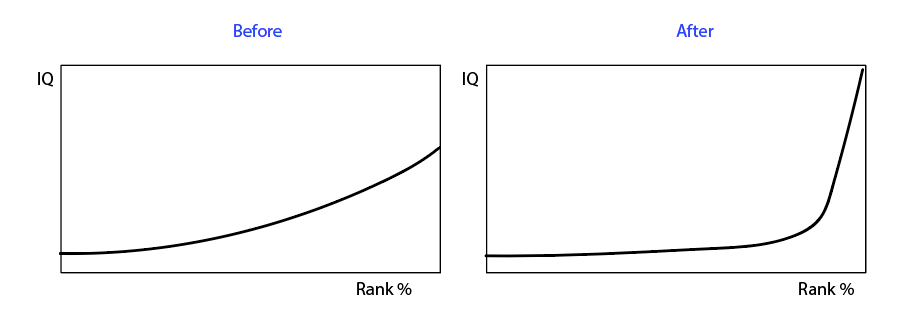Imagine you could only interact with the other people in a small town. The personalities, interests, and hobbies that you could be exposed to are limited by geographical location.
In a small population, there may be some people with fringe ideas or unusual interests, but not in great enough numbers to form dedicated communities.
But recently, interconnectedness has risen with the forces of globalization and technology (ex: travel and telecommunications).
According to the left-wing idealistic view, this will give people more exposure to diversity. Small towns tend to be homogenous, so the argument goes, and interconnectedness will broaden horizons.

The flaw in this argument is that people are not naturally inclined to seek out others with different views than them. Rather, they seek out others with the same views.
This is a positive for unusual interests, like origami, 1880s fashion, or ASMR. A smaller population may not support communities dedicated to more obscure subjects, but interconnectedness can.
On the other hand, the Internet allows you to stay isolated in a community where every person holds the same unusual (or fringe) view set. This isn’t all bad, because it lets you explore ideas in depth. It’s easier to move a boat when every person is rowing in the same direction.
But the danger is the famous siloing affect on ideas. Sure, a wider range political ideas are discoverable, but only for those willing to look.
For what it’s worth, I think the Internet has made me more aware of the range of political views, as well as my opponents’ positions. That, though, may be a specific consequence of my views and inclinations.
This is the paradox of interconnectedness: as the range of discoverable things increases, you can actually get more in a bubble and less exposure to personalities/ideas/interests different than your own.

I’m not treading new ground here. All of the insights I have stated so far are so oft repeated as to almost sound trite. However, I don’t think people discuss enough the potential consequences of these facts for human biology.
Consider the following list of facts facts. Smart people tend to want to marry other smart people. College admissions select for, to some extent, intelligence. Finally, many (most?) people who get married meet at college.
Suppose you are very smart man. Before interconnectedness, you’d marry at best the smartest girl your age in your town (that is to say: smart, but for the town). As intelligence is mostly genetic, your children will be pretty smart, but for the town.
Now, you can select from the engineering department at Harvard a mate who has an IQ of 140 also. Your children will be extremely smart.
Charles Murray alludes to this phenomenon in his book, Coming Apart. From this speech:
During the 1950, colleges, especially elite colleges, changed the nature of their student bodies … The entering class in 1952 in Harvard University had a mean SAT verbal score of around 580 … 8 years later, the incoming class in Harvard had mean SAT verbal scores around 680 … up by a full standard deviation.
The collateral effect is that you got critical masses of people who could form cultures quite distinctive of their own.
Those “distinct cultures” are the cultures of the left.
And from this speech:
Sometimes things that are good overall have problematic side effects… The first of the forces [of stratification] would seem to be something of unmitigated good.
And that is that during the 1950s, elite colleges started to reach out to much greater parts of America, and draw in students who had never been drawn in before, purely on the basis of their academic ability.
In a direct respect, it was a good thing that colleges gave opportunities to smart people from more places. However, it created cognitive segregation, what I’ve brought up before: the cognitive stratification of society.
This creates brain drain. When the smartest people from rural areas and small towns are accepted to good colleges, the affect is the most intelligent and ambitious people leaving for areas that can support colleges. This is a compounding affect, as the leaving of smart people worsens rural areas which only creates more of an incentive to leave.
The rural areas end up left behind and dilapidated. This is, with overwhelming evidence, why Trump won.
Meanwhile, the elite cities flourish, as the IQ-sorting ability of colleges has a eugenic affect on such populations. This occurs at the same time as dysgenic affects pulling in the opposite direction; the fertility rate is higher among the poorer, less educated, and so on.
To reconcile these opposing ideas, I predict two changes in the distribution of intelligence. In the future:
- Less intelligent people will increase in proportional quantity
- More intelligent people will be more intelligent than of past
This is the most worrying form of rising inequality.
